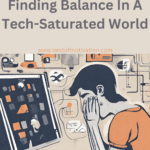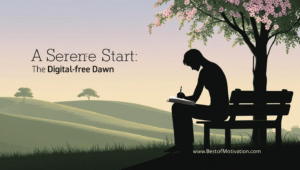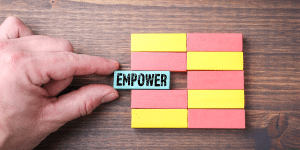The digital age has ushered in unparalleled convenience and connectivity but has also brought about a new challenge – information overload and constant distractions. As we navigate through a sea of notifications, updates, and alerts, the concept of digital minimalism has emerged as a beacon of balance in a tech-saturated world.
In this blog post, we delve into the rise of digital minimalism and how it serves as a guide to finding harmony between our online and offline lives. As we ponder the significance of disconnecting to reconnect, it prompts us to question our relationship with technology and its impact on our well-being.
By exploring practical strategies and mindful approaches to curating our digital consumption, we aim to empower individuals to reclaim their time, focus, and ultimately, their autonomy in a digitally driven society.
Understanding Digital Minimalism
Digital minimalism is a lifestyle choice that aims to find a balance between technology use and real-world activities. By embracing digital minimalism, individuals seek to declutter their digital lives, reduce distractions, and enhance their overall well-being.
Definition and Origins
The concept of digital minimalism revolves around the idea of intentional technology use. It encourages individuals to evaluate and streamline their digital interactions to focus on what truly matters. Originating from the need to combat information overload and constant connectivity, digital minimalism promotes a mindful approach to technology consumption.
Core Principles of Digital Minimalism
- Intentionality: Digital minimalism emphasizes purposeful and deliberate use of technology, avoiding mindless scrolling or excessive screen time.
- Quality over Quantity: It advocates for quality interactions and content consumption over a constant influx of information.
- Digital Decluttering: Regularly reassessing digital tools and apps to eliminate those that do not align with priorities or values.
- Mindful Engagement: Being present and mindful in digital interactions to foster deeper connections and avoid multitasking.
Benefits of Embracing Digital Minimalism
Embracing digital minimalism can yield numerous benefits for mental well-being and productivity. Statistics show that:
- According to TechTarget, 75% of individuals reported reduced stress levels after adopting digital minimalism practices.
- Cal Newport highlights that 60% of digital minimalists reported higher levels of focus and concentration.
- Digital minimalism can lead to a 40% increase in productivity, as mentioned by Dave Chaffey.
By embracing digital minimalism, individuals can achieve a healthier relationship with technology, leading to improved focus, reduced stress, and enhanced overall well-being.
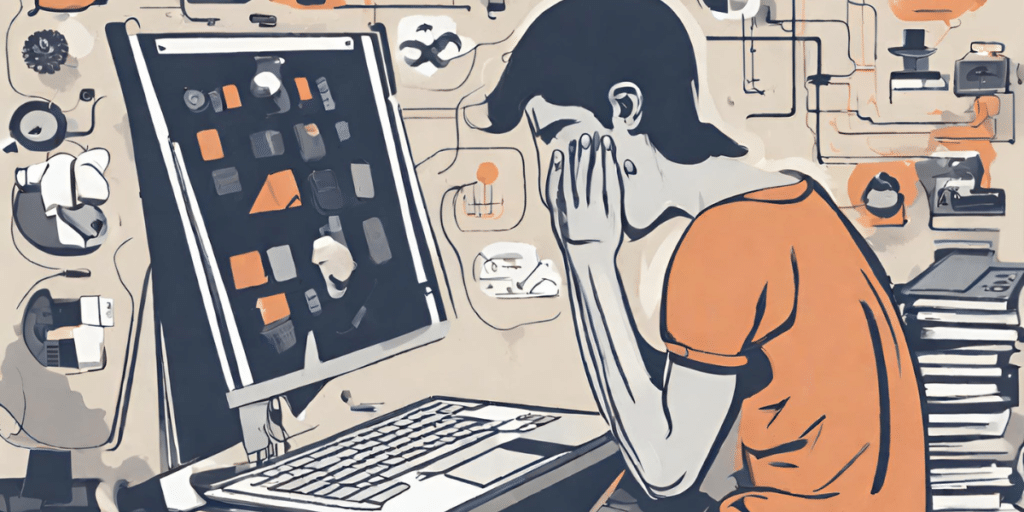
Challenges in a Hyperconnected World
Living in a hyperconnected world comes with its own set of challenges that can profoundly impact our daily lives. Let’s delve into the various aspects where the digital realm intersects with our reality, presenting unique hurdles that we navigate regularly.
Impact of Technology Overload on Mental Health
The constant barrage of notifications, emails, and social media updates can have a significant impact on our mental well-being. The perpetual cycle of being plugged in can lead to increased stress, anxiety, and even feelings of isolation. Research has shown that excessive screen time can disrupt sleep patterns, affect mood regulation, and contribute to a sense of digital burnout. It’s crucial to find a balance in our digital consumption to safeguard our mental health in this hyperconnected age.^Source
Social Implications of Constant Connectivity
In a world where we are always connected, maintaining meaningful relationships and genuine interactions can become a challenge. The pressure to constantly engage with peers online, present a curated version of ourselves, and seek validation through likes and comments can strain our social connections. This constant connectivity can blur the lines between real-life experiences and digital personas, impacting our ability to form authentic relationships and have meaningful conversations. Balancing our online presence with genuine human interaction is key to addressing the social implications of this hyperconnected era.^Source
Productivity and Focus Challenges
With the world at our fingertips, distractions are just a click away. The allure of endless scrolling, binge-watching, and multitasking can hinder our ability to focus and be productive. The dopamine-driven nature of apps and devices keeps us hooked, making it challenging to stay on task and accomplish our goals efficiently. Finding strategies to combat digital distractions, such as setting boundaries, practicing mindfulness, and embracing digital detoxes, is crucial in overcoming productivity challenges in a hyperconnected world.^Source
Strategies for Implementing Digital Minimalism
Living in a digital world, surrounded by screens and notifications, can often lead to feeling overwhelmed. Implementing digital minimalism is about finding a balance between technology and life. By decluttering your digital space, establishing healthy habits, and creating tech-free zones, you can reclaim control over your time and attention.
Digital Decluttering Techniques
Digital decluttering involves simplifying your online life by organizing and reducing digital distractions. Here is a step-by-step guide to kickstart your digital decluttering journey:
- Assess Your Digital Usage: Start by tracking your screen time to understand where you spend the most time online.
- Delete Unnecessary Apps: Remove apps that no longer serve a purpose or contribute to productivity.
- Organise Digital Files: Sort through emails, documents, and photos, and delete or archive outdated or irrelevant items.
- Digital Detox Days: Designate specific days for a complete break from screens to reset and recharge.
Embracing these decluttering techniques will help you streamline your digital life and create a more mindful relationship with technology.
Establishing Healthy Tech Habits
Building healthy tech habits is essential for maintaining a balanced digital lifestyle. Here are some tips to establish positive routines:
- Set Boundaries: Define specific times for screen use and stick to them to prevent mindless scrolling.
- Practice Mindfulness: Be present and intentional when using technology to avoid falling into the trap of constant distraction.
- Limit Notifications: Disable unnecessary notifications to reduce interruptions and enhance focus.
- Engage in Tech-Free Activities: Prioritise offline hobbies and activities that promote real-world connections and personal growth.
By cultivating healthy tech habits, you can cultivate a healthier relationship with digital devices and improve your overall well-being.
Creating Digital-Free Zones
Designating digital-free zones in your home or workplace can help you disconnect from screens and foster a sense of tranquillity. Consider the following ideas to establish tech-free spaces:
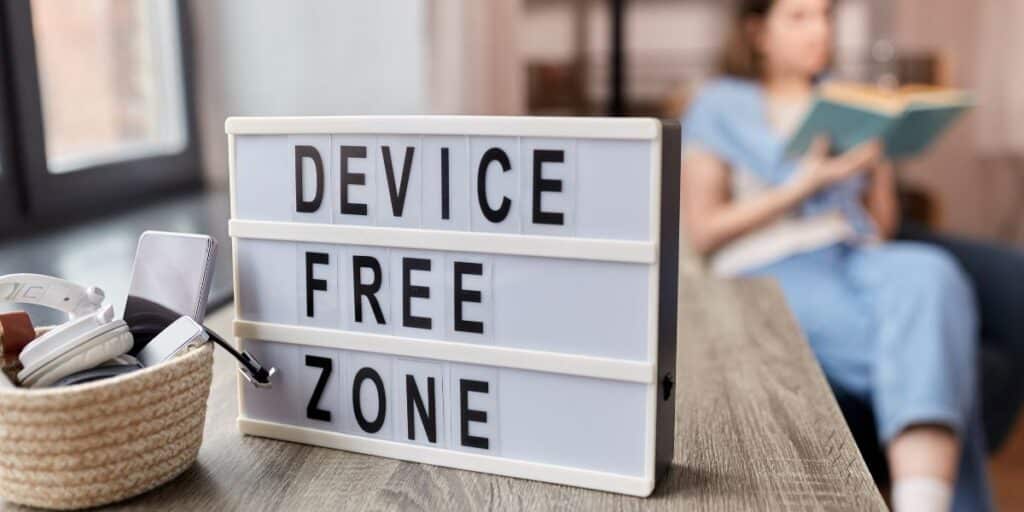
- Bedroom Sanctuary: Keep smartphones and laptops out of the bedroom to promote better sleep and relaxation.
- Family Meal Times: Set a rule of no devices during meal times to encourage meaningful conversations and shared moments.
- Nature Retreat: Designate outdoor areas as tech-free zones to enjoy nature without digital distractions.
- Home Workspace: Create a distraction-free workspace by limiting the presence of digital devices to boost productivity.
Introducing digital-free zones allows you to unplug, unwind, and focus on the present moment without the constant buzz of technology.
Implementing these strategies for digital minimalism can help you strike a healthy balance between the digital world and real life, fostering a more mindful and fulfilling existence. Check out this comprehensive guide for more tips on simplifying your digital life.
Balancing Act: Finding Harmony in the Digital Age
In today’s fast-paced digital landscape, striking a balance between our online and offline lives has become increasingly crucial. The constant connectivity and digital distractions can often lead to feelings of overwhelm and burnout. Finding harmony in the digital age involves incorporating mindfulness practices, setting boundaries with technology, and engaging in offline activities to nourish our well-being.
Incorporating Mindfulness Practices
Mindfulness is about being present in the moment, fully aware of our thoughts and feelings without judgment. In the digital age, where notifications constantly demand our attention, mindfulness can help us stay grounded. By incorporating simple practices like deep breathing exercises, mindful walking, or digital detox sessions, we can cultivate a sense of calm and focus amid the digital noise.
Setting Boundaries with Technology
Setting boundaries with technology is essential to prevent tech overload and reclaim control over our digital habits. Establishing designated tech-free zones in your home, implementing screen time limits, and turning off notifications during dedicated periods of focus can help strike a healthy balance. By being intentional about when and how we engage with technology, we can create space for meaningful offline experiences.
Engaging in Offline Activities
In a world dominated by screens, engaging in offline activities is a refreshing way to reconnect with the physical world. Whether it’s pursuing a hobby, spending time in nature, or socialising face-to-face, offline activities offer a break from the digital realm. By immersing ourselves in real-world experiences, we can foster deeper connections, reduce stress, and find joy beyond the confines of our devices.
Finding harmony in the digital age is an ongoing journey that requires conscious effort and self-awareness. By blending mindfulness practices, setting tech boundaries, and embracing offline pursuits, we can create a more balanced and fulfilling relationship with technology, allowing space for personal growth and genuine connections.
Measuring Success and Sustaining Digital Minimalism
In the journey towards digital minimalism, measuring success and sustaining the practice are vital aspects that can shape your experience. Checking progress and adapting strategies play a pivotal role in ensuring that your efforts are moving in the right direction.
Tracking Progress and Adapting Strategies
Tracking your digital minimalism journey allows you to see how far you’ve come and identify areas for improvement. Establish measurable goals, such as reducing screen time or decluttering digital spaces, to track your progress effectively. By regularly reviewing your habits and reflecting on the impact of your minimalist approach, you can adapt strategies to align better with your goals.
Overcoming Relapses and Resisting Temptations
It’s natural to face challenges and experience relapses on the path to digital minimalism. When setbacks occur, it’s essential to stay motivated and focused on your end goal. Implementing strategies such as taking regular digital detoxes, setting device-free zones, and practising mindfulness can help you overcome temptations and regain your momentum.
Building a Supportive Community
Creating or joining a supportive community of like-minded individuals pursuing digital minimalism can provide encouragement and valuable insights. Sharing experiences, tips, and motivational messages with others can foster a sense of camaraderie and accountability. Engaging with a community that shares your values can strengthen your commitment to sustaining digital minimalism in the long run.
For more insights on the sustainable benefits of digital minimalism, check out Digital Minimalism: The Path to Sustainable IT Service. Stay inspired on your journey towards a balanced life with technology.
Conclusion
In conclusion, embracing digital minimalism is not about disconnecting entirely from the digital world, but rather about finding a harmonious balance between technology and real-life experiences. By prioritising our time and attention on what truly matters, we can reclaim control over our lives and foster deeper connections with both ourselves and others. Let us navigate the digital landscape with intention, mindfulness, and a conscious effort to strike a healthy equilibrium between the virtual and the tangible. Embrace the power of digital minimalism to lead a more fulfilling and purposeful existence in this fast-paced digital age.
Related Links:

